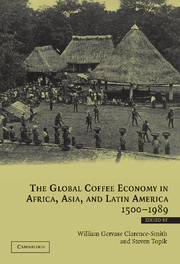Book contents
- Frontmatter
- Contents
- World coffee production
- Guatemala and Mexico
- Nicaragua and Costa Rica
- Brazil
- Cameroon
- Madagascar and Réunion
- East Africa
- Red Sea
- Ceylon and South India
- Java
- Introduction: Coffee and Global Development
- I ORIGINS OF THE WORLD COFFEE ECONOMY
- II PEASANTS: RACE, GENDER, AND PROPERTY
- 6 Coffee Cultivation in Java, 1830–1917
- 7 Labor, Race, and Gender on the Coffee Plantations in Ceylon (Sri Lanka), 1834–1880
- 8 Coffee and Indigenous Labor in Guatemala, 1871–1980
- 9 Patriarchy from Above, Patriarchy from Below: Debt Peonage on Nicaraguan Coffee Estates, 1870–1930
- 10 Small Farmers and Coffee in Nicaragua
- III COFFEE, POLITICS, AND STATE BUILDING
- Conclusion: New Propositions and a Research Agenda
- Appendix: Historical Statistics of Coffee Production and Trade from 1700 to 1960
- Index
10 - Small Farmers and Coffee in Nicaragua
Published online by Cambridge University Press: 01 September 2009
- Frontmatter
- Contents
- World coffee production
- Guatemala and Mexico
- Nicaragua and Costa Rica
- Brazil
- Cameroon
- Madagascar and Réunion
- East Africa
- Red Sea
- Ceylon and South India
- Java
- Introduction: Coffee and Global Development
- I ORIGINS OF THE WORLD COFFEE ECONOMY
- II PEASANTS: RACE, GENDER, AND PROPERTY
- 6 Coffee Cultivation in Java, 1830–1917
- 7 Labor, Race, and Gender on the Coffee Plantations in Ceylon (Sri Lanka), 1834–1880
- 8 Coffee and Indigenous Labor in Guatemala, 1871–1980
- 9 Patriarchy from Above, Patriarchy from Below: Debt Peonage on Nicaraguan Coffee Estates, 1870–1930
- 10 Small Farmers and Coffee in Nicaragua
- III COFFEE, POLITICS, AND STATE BUILDING
- Conclusion: New Propositions and a Research Agenda
- Appendix: Historical Statistics of Coffee Production and Trade from 1700 to 1960
- Index
Summary
The coffee industry that began in Nicaragua's Carazo region circa 1880–1930 brought significant changes to the country's economy and society, but widespread proletarianization was not one of them. Even as a handful of large coffee growers came to dominate production, financing, and processing, most of the land was still held by the far larger number of small and medium-sized coffee producers. These smaller producers joined in the new coffee economy in the same ways as their larger counterparts: producing and selling coffee, buying and selling land, splintering and amalgamating landholdings, borrowing and lending money. They became active and willing participants who likely viewed the economy in the same way as their richer neighbors. The only aspect of the coffee economy in which smaller growers did not participate in the same ways was in processing and exporting, which became the exclusive and lucrative domain of the largest growers.
The subsistence farming sector, however, did not disappear. In fact, it expanded, thanks to state-guaranteed access to land in the ejidos (territory provided by the state to muncipalities and distributed to the landless for free or at nominal rates). These subsistence farmers were the backbone of the labor force needed only seasonally on the larger coffee farms, where they were sometimes joined by small coffee farmers who needed to earn extra income.
- Type
- Chapter
- Information
- Publisher: Cambridge University PressPrint publication year: 2003



